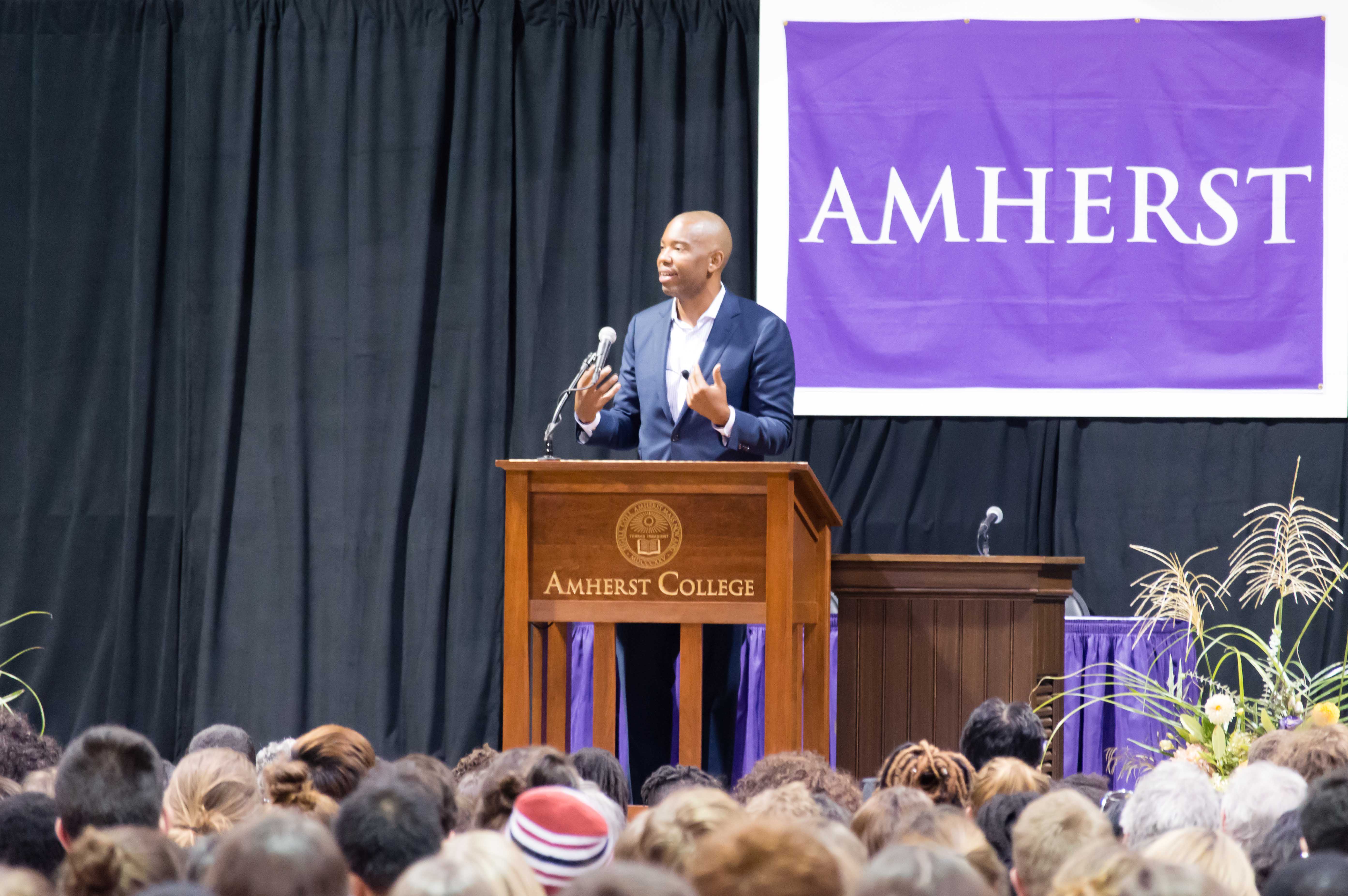

Acclaimed writer and journalist Ta-Nehisi Coates gave a talk titled “Race in America” in LeFrak Gymnasium on Tuesday, Sept. 13. For an hour, Coates spoke on the history and his own experiences of being black in America, then spent another half hour answering questions from the audience.
The talk was open to the public, with seating preference given to members of the Amherst community, and the gymnasium was filled to capacity with nearby overflow locations streaming the talk.
Currently a national correspondent for the Atlantic Magazine, Coates has written for several other publications and received a MacArthur Foundation “Genius Grant” in 2015 and the National Book Award in nonfiction for his 2015 book “Between the World and Me.”
After President Biddy Martin introduced him, Coates began his talk by reading an excerpt from “Between the World and Me,” which he used to introduce his experiences of growing up in West Baltimore.
“I was born into a certain portion of America where fear was a defining reality,” Coates said. “The kind of existential fear that I felt as a black American wasn’t present [in other parts of America].” That fear, he said, came with an understanding “that your parents are actually afraid, that there are forces … that they cannot protect you from.”
Coates said that his realization of the fear and violence experienced by many black Americans also came from watching depictions of white, generally well-to-do American families on television that were unlike the realities of his own life.
“Why didn’t I know anything like that? Any families like that?” he said. “It was a story that the country told me about this other world … of the dream … that black Americans did not enjoy at the time.”
The “dream,” Coates said, was “of America as being the sort of place where you can put a stake down and buy a plot of land … that idea was intimately linked to the idea of slavery.”
From there, Coates changed his focus to the history of slavery in America and how American policy has shaped ideas of race and racism.
“This ‘dream’ haunts even our greatest achievements,” Coates said. He compared slavery to modern-day homeownership and said that at the time, it “created the unity of white identity.”
Coates also related discriminatory policies from the Jim Crow era through recent years to current inequality, poverty and unemployment trends. He also criticized the idea of American exceptionalism as a factor in the formation of those policies.
To end his talk, Coates spoke about the current U.S. election. Criticisms of President Barack Obama based on questioning his Americanness or birthplace were “subtracting the benefits of citizenship from black people,” he said. Regarding Republican presidential nominee Donald Trump, he said that “you couldn’t be … candidate for governor, acting like that, if you were black … much less for president.”
“It sounds like I’m giving an endorsement speech for Hillary Clinton,” Coates said. “I’m giving an un-endorsement for ignorance.”
During the question and answer session, audience members posed questions on topics ranging from interracial relationships and the concept of race to modern-day slavery. In the discussion, Coates also gave his thoughts on police brutality, America’s history of slavery, campus activism and “safe spaces.”
“I thought his ability to explain that argument and analysis was extraordinary,” President Martin said in an interview after the talk. “I thought the questions were extraordinary, and his responses showed more humility than I’ve virtually ever heard from a speaker. I could also feel that the excitement in the audience, the attentiveness and the desire to think with him was palpable.”
“It was a privilege to have Ta-Nehisi Coates at Amherst,” said Cullen Murphy ’74, the chair of the college’s board of trustees, in an email interview. “As Biddy noted in her introduction, he raises some of the most important questions our society needs to face, and as he demonstrated in person, he does so in a way that invites engagement and reflection rather than resistance. That’s not easy, and it’s all too rare in public life.”
Prior to his talk, Coates also held a small private class with 25 students who were randomly chosen out of 169 total applicants. According to Paola Garcia ’18, who was present, the class was structured as a question and answer session with Coates, moderated by English, Black Studies and Film and Media Studies Professor Marisa Parham.
“It was an opportunity for students to ask questions that meant a lot to us,” said Amir Hall ’17, another student in the private class. “One of the things he said that struck me was about freedom. He said that once he had accepted the limits as a black person, he found freedom … I thought of what that means for us here ... Coates helped me think about freedom in the sense of my racialized self but also in the sense of staying afloat in a place like [Amherst College].”
Coates’ visit to the college was funded by the Victor S. Johnson 1882-1943 Lectureship Fund and the Croxton Lecture Fund, both of which were established by alumni to hold events with prominent speakers at the college.